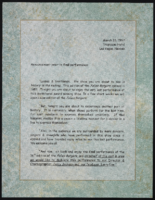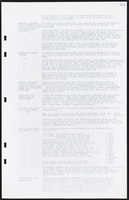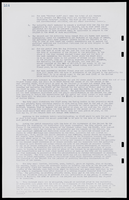Search the Special Collections and Archives Portal
Search Results
Audio recording clip of interview with Roosevelt Toston by Claytee D. White, July 11, 2006
Date
Archival Collection
Description
Part of an interview with Roosevelt Toston conducted by Claytee D. White on July 11, 2006. Toston recalls how he began working in broadcasting.
Sound
Audio recording clip of interview with Dr. Angela Clarke by Lisa Gioia-Acres, October 3, 2008
Date
Archival Collection
Description
Part of an interview with Dr. Angela Clark by Lisa Gioia-Acres on October 3, 2008. Clarke describes how she came to practice medicine in Las Vegas.
Sound
Audio recording clip from the fourth interview with Senator Joe Neal by Claytee D. White, March 24, 2006
Date
Archival Collection
Description
Part of the fourth interview with Senator Joe Neal conducted by Claytee D. White on March 24, 2006. Five interviews cover Neal's life from his birth in Mounds, Louisiana, in 1935 to his service as a local politician and community leader. Shortly after joining his family in Las Vegas, Neal served in the United States Air Force from 1954 to 1958. Following his military service, he earned a bachelor's degree in political science at Southern University in Baton Rouge, Louisiana. Neal continued his education at the Institute of Applied Science in Chicago, Illinois, with postgraduate work in law. From 1973 to 2001, he served in the Nevada Legislature as the Senator from Clark County Senatorial District No. 4. In the clip, Neal comments on his experience in Nevada politics.
Sound
Audio recording clip from the fifth interview with Senator Joe Neal by Claytee D. White, June 1, 2006
Date
Archival Collection
Description
Part of an interview with Senator Joe Neal by Claytee White on June 1, 2006. Neal talks about his work in local government and working to prevent fraud in the election of Aaron Williams, the first African American North Las Vegas city councilman.
Sound
Audio recording clip of interview with Paul Pradia by Claytee D. White, July 13, 2010
Date
Archival Collection
Description
Part of an interview with Paul Pradia conducted by Claytee D. White on July 13, 2010. Pradia describes how golfing helped him advance his career and his support of women golfers.
Sound

Announcement on the final performance
Date
Archival Collection
Description
Series II. Folies-Bergere production papers, designs, and photographs -- 16th Edition
Text

Transcript of interview with Herb Tobman by Deborah Fischer, March 13, 1981
Date
Archival Collection
Description
Interview with Herb Tobman by Deborah Fischer on March 13, 1981. In this interview on the subject of gambling, Herb Tobman talks about moving to Las Vegas while working for Standard Oil as a tire, battery and accessory salesman, then began working for the Moulin Rouge as the general manager in 1955. He gives a description of the hotels on Las Vegas Boulevard and downtown, and the "western" nature of town where people rode horses. Tobman then discusses the types of gambling that were popular: slot machines, blackjack and craps. He also talks about the accommodations (hotels and motels) available in the 1950s, transportation to and from the area, entertainment, and the economy. The interviewer continually asks Tobman to compare 1950s Las Vegas with 1980s Las Vegas in terms of the gambling environment.
Text


